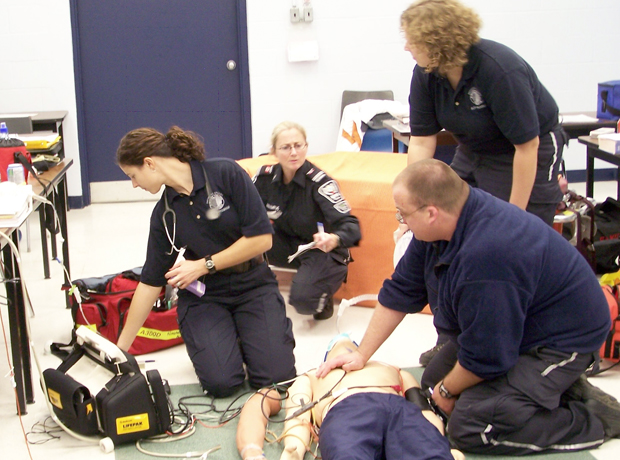Live Courses included:
NCCP L1: Airway Anatomy and Physiology – Adult and Pediatric
NCCP L2: Basic Airway Management, CPAP/BiPAP
NCCP L3: Cardiac Emergencies – Adult and Pediatric
NCCP L4: Cardiac Resuscitation – Pediatric
NCCP L5: Heart Failure and VADs, Trauma Assessment
NCCP L6: Bleeding Control/Shock, CNS Trauma
NCCP L7: Ambulance Safety, Evidence Based Guidelines
NCCP L8: Medical Emergencies Overview, Opioids
NCCP L9: Allergic Reactions/Anaphylaxis, Environmental Emergencies
NCCP L10: Diabetic Emergencies, Pediatric Emergencies
NCCP L11: Sepsis, Neurological Emergencies
NCCP L12: Advanced Airway Management
NCCP L13: Advanced Cardiac Management – Adult and Pediatric
NCCP L14: Advanced Trauma Management
NCCP L15: Crew Resource Management, MCI Response
Anytime Courses included:
Airway, Respiration & Ventilation
· Online: Basic Airway Care
· Carbon Monoxide Poisoning
· Online: Critical Airway Management
· Geriatric Respiratory Emergencies
· Pediatric Respiratory Emergencies
· Pediatric Airway Management
· Supraglottic Airway Management
· Capnography
Cardiovascular
· Code Management
· Online: VAD Patients: EMS Response
· Medical Assessment
· Geriatric Assessment
· Stroke
· Sudden Cardiac Death
· Online: Pediatric Cardiac Arrest: Management and Response
· 12-Lead Electrocardiogram (ECG)
· Acute Coronary Syndrome (ACS) Care
· Heart Failure
Trauma
· Abdominal Trauma
· Blunt Chest Trauma
· Bomb Blast Injuries
· Crush Injuries
· Combat-Related TBI
· Geriatric Trauma: Hip Injuries
· Sports Injuries
· Tourniquets & Hemorrhage Control
· Trauma During Pregnancy
· Triage
· Intraosseous Vascular Access
· Pediatric Emergencies: Burns
Medical Emergencies
· Abdominal Emergencies
· Anaphylaxis
· Asthma
· Deaf and Hard of Hearing: Response Awareness
· Cyanide Poisonings
· Diabetic Emergencies
· Geriatric Behavioral Emergencies
· Geriatric Poisonings
· Obstetrics/Childbirth
· Ebola Awareness for EMS
· Infection Control: MRSA
· Infectious Disease Update & Personal Protection
· Pediatric Behavioral Emergencies: Autism (ASD)
· Pediatric Fevers and Seizures
· Street Drugs
· Communicable Diseases: Childhood & Travelers
· Opioid Epidemic: Response for EMS
· Pediatric Poisoning
· Pregnancy: Medical Emergencies
· Seizures
· Pain Management
· Medical Delivery in EMS
Operational Tasks
· Online: Pediatric Transport
· Online: Pediatric Equipment
· Assault Victim Care
· Bariatric Patient: Care & Transport
· Crew Resource Management
· Domestic Violence
· Online: Human Trafficking: An EMS Perspective
· Pediatric Assessment
· Emergency Driving
· Emergency Vehicle Operations
· DMAT & Mass Gathering Medicine
· Managing Multiple Patients: EMS Operations
· MCI Management: Transportation Group
· Back Injury Prevention for EMS
· Emergency Responders, Fire, and Cancer
· Lifting & Moving
· Respiratory Protection for Emergency Responders
· Responder Wellness and Fitness
· The Role of Research and EBGs
· HazMat: EMS Response
· Medication Errors & Equipment Failures
· Report Writing
· Scene Safety
· Scene Safety: Meth Labs
· Workplace Stress
Other
· Bloodborne Pathogens
· Affective Characteristics
· Agricultural HazMat: EMS Response
· Air Medical Transports
· Assessment: Medical Patient
· Burns: Thermal
· Cold Weather Emergencies: Hypothermia
· Critical Decision Making
· Electrical Injuries
· EMS Flood Response
· Entrapped Patients
· Eye Injuries: Response for EMS
· Extreme Heat Emergencies
· Extreme Sports Injuries: Extremity Trauma
· Extended Patient Care Transports
· Extrication & Patient Packaging
· Facial Injuries
· Mechanism of Injury
· Medical Assessment: Syncope
· Interpreting Vital Signs
· MVC Management
· Musculoskeletal Emergencies
· Patient Refusal
· Pediatric Trauma
· Rehab Sector: The Role of EMS
· Renal Failure: Acute
· Renal Failure: Chronic
· Risk Management: Refusals & Abandonment
· Social Media & EMS
· Summer Emergencies
· Terrorism: EMS Readiness
· Trauma Assessment
· Water Rescue Considerations for EMS
· Understanding Shock
eCPR Topics included:
· Sudden Cardiac Arrest
· Early Defibrillation
· Chain of Survival
· Secondary Cardiac Arrest
· Secondary Cardiac Arrest – Children and Infants
· Secondary Cardiac Arrest – Opioid Overdose
· Personal Safety
· Standard Precautions
· Personal Protective Equipment
· Calling for Help
· High-Performance CPR
· Chest Compressions
· Rescue Breaths – CPR Mask
· Rescue Breaths – Bag-Mask Making the Workplace and Community Safer™
· Automated External Defibrillation
· BLS Assessment
· Recovery Position
· Caring for Respiratory Arrest
· Caring for Cardiac Arrest
· Multiple Provider Approach to CPR
· Choking
eACLS Topics included:
· Acute coronary syndromes
· AED use
· Asystole
· Bradycardia
· Narrow complex tachycardia
· Pulseless electrical activity
· Respiratory arrest
· Stroke
· Ventricular fibrillation and pulseless ventricular tachycardia
· Wide complex tachycardia


